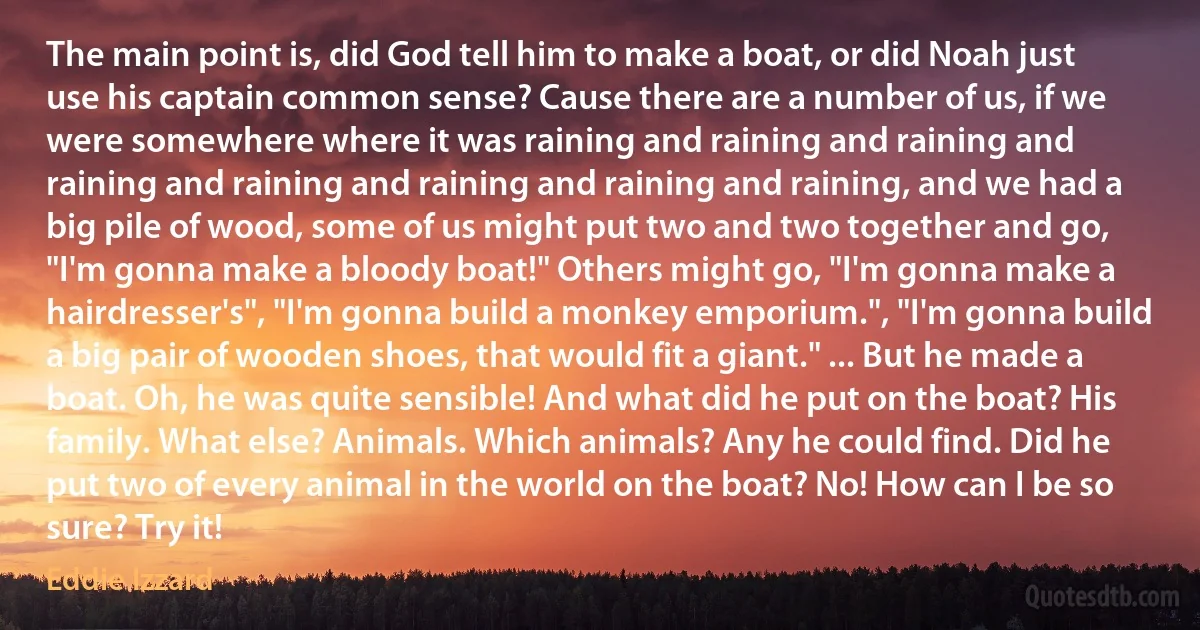
The main point is, did God tell him to make a boat, or did Noah just use his captain common sense? Cause there are a number of us, if we were somewhere where it was raining and raining and raining and raining and raining and raining and raining and raining, and we had a big pile of wood, some of us might put two and two together and go, "I'm gonna make a bloody boat!" Others might go, "I'm gonna make a hairdresser's", "I'm gonna build a monkey emporium.", "I'm gonna build a big pair of wooden shoes, that would fit a giant." ... But he made a boat. Oh, he was quite sensible! And what did he put on the boat? His family. What else? Animals. Which animals? Any he could find. Did he put two of every animal in the world on the boat? No! How can I be so sure? Try it!
Eddie IzzardRelated topics
animal boat build cause common family find fit giant might monkey noah number pair point quite raining sense shoes somewhere sure tell try use wood world othersRelated quotes
It is quite true that, to the best of my judgment, the argumentation which applies to brutes holds equally good of men; and, therefore, that all states of consciousness in us, as in them, are immediately caused by molecular changes of the brain-substance. It seems to me that in men, as in brutes, there is no proof that any state of consciousness is the cause of change in the motion of the matter of the organism. If these positions are well based, it follows that our mental conditions are simply the symbols in consciousness of the changes which takes place automatically in the organism; and that, to take an extreme illustration, the feeling we call volition is not the cause of a voluntary act, but the symbol of that state of the brain which is the immediate cause of that act.

Thomas Henry Huxley
Let us not despair; it is a blessed cause, and success, ere long, will crown our exertions. Already we have gained one victory; we have obtained, for these poor creatures, the recognition of their human nature, which, for a while was most shamefully denied. This is the first fruits of our efforts; let us persevere and our triumph will be complete. Never, never will we desist till we have wiped away this scandal from the Christian name, released ourselves from the load of guilt, under which we at present labour, and extinguished every trace of this bloody traffic, of which our posterity, looking back to the history of these enlightened times, will scarce believe that it has been suffered to exist so long a disgrace and dishonour to this country.

William Wilberforce
I'm aware of the made up declarations about me that have recently begun to appear on the Internet and in emails as "Chuck Norris facts." I've seen some of them. Some are funny. Some are pretty far out. Being more a student of the Wild West than the wild world of the Internet, I'm not quite sure what to make of it. It's quite surprising. I do know that boys will be boys, and I neither take offense nor take these things too seriously. Who knows, maybe these made up one-liners will prompt young people to seek out the real facts as found in my recent autobiographical book, "Against All Odds?" They may even be interested enough to check out my novels set in the Old West, "The Justice Riders," released this month. I'm very proud of these literary efforts.

Chuck Norris
Centuries ago, sailors on long voyages used to leave a pair of pigs on every deserted island. Or they'd leave a pair of goats. Either way, on any future visit, the island would be a source of meat. These islands, they were pristine. These were home to breeds of birds with no natural predators. Breeds of birds that lived nowhere else on earth. The plants there, without enemies they evolved without thorns or poisons. Without predators and enemies, these islands, they were paradise. The sailors, the next time they visited these islands, the only things still there would be herds of goats or pigs. .... Does this remind you of anything Maybe the ol' Adam and Eve story .... You ever wonder when God's coming back with a lot of barbecue sauce.

Chuck Palahniuk
For what advantage is it, that the world enjoys profound peace, if thou art at war with thyself? This then is the peace we should keep. If we have it, nothing from without will be able to harm us. And to this end the public peace contributes no little: whence it is said, ‘That we may lead a quiet and peaceable life.' But if any one is disturbed when there is quiet, he is a miserable creature. Seest thou that He speaks of this peace which I call the third (inner, ed.) kind? Therefore when he has said, ‘that we may lead a quiet and peaceable life,' he does not stop there, but adds ‘in all godliness and honesty.' But we cannot live in godliness and honesty, unless that peace be established. For when curious reasonings disturb our faith, what peace is there? or when spirits of uncleanness, what peace is there?

John Chrysostom
